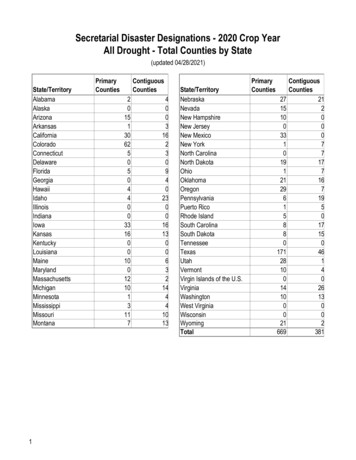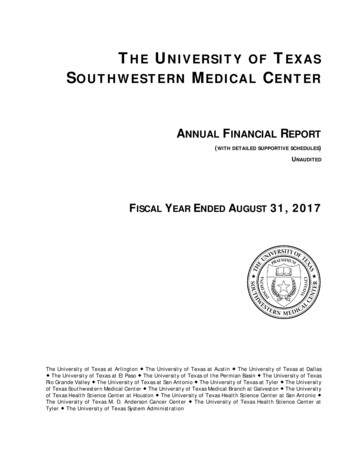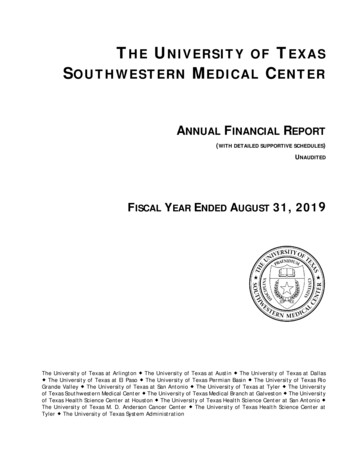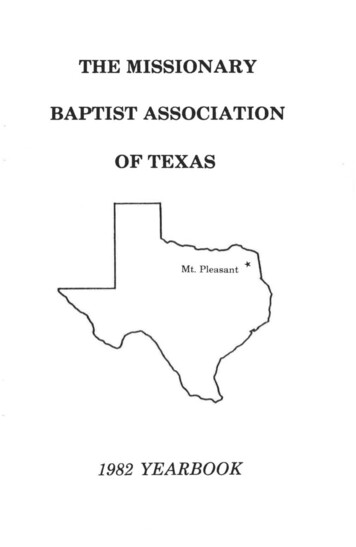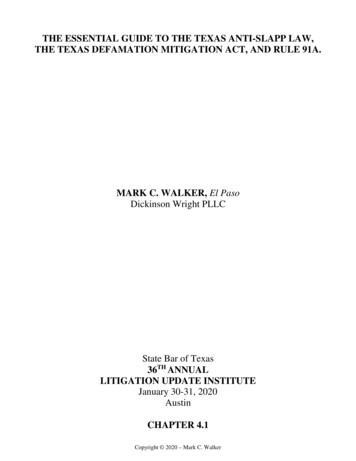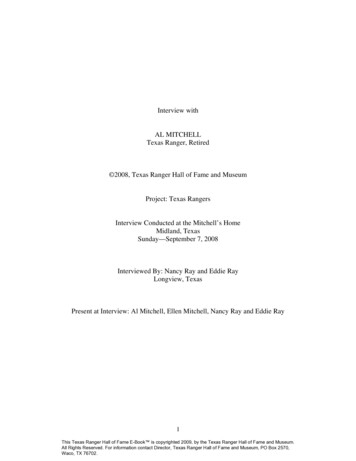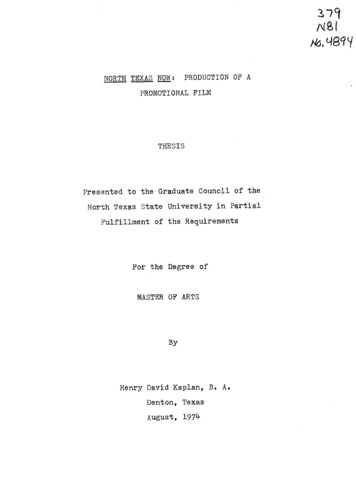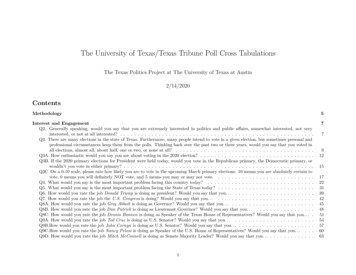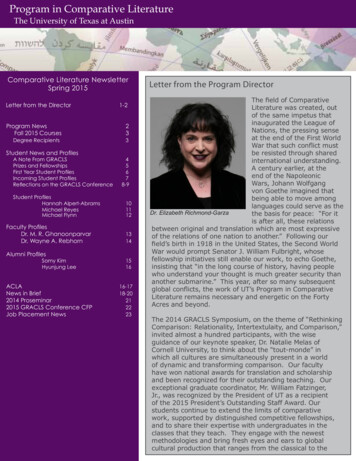
Transcription
Program in Comparative LiteratureThe University of Texas at AustinComparative LiteratureT h e u n i v e r s i t y of t e x a s at a u s t i nComparative Literature NewsletterSpring 2015Letter from the DirectorProgram NewsFall 2015 CoursesDegree RecipientsStudent News and ProfilesA Note From GRACLSPrizes and FellowshipsFirst Year Student ProfilesIncoming Student ProfilesReflections on the GRACLS ConferenceStudent ProfilesHannah Alpert-AbramsMichael ReyesMichael FlynnFaculty ProfilesDr. M. R. GhanoonparvarDr. Wayne A. RebhornAlumni ProfilesSomy KimHyunjung LeeACLANews in Brief2014 Proseminar2015 GRACLS Conference CFPJob Placement ter from the Program DirectorThe field of ComparativeLiterature was created, outof the same impetus thatinaugurated the League ofNations, the pressing senseat the end of the First WorldWar that such conflict mustbe resisted through sharedinternational understanding.A century earlier, at theend of the NapoleonicWars, Johann Wolfgangvon Goethe imagined thatbeing able to move amonglanguages could serve as theDr. Elizabeth Richmond-Garzathe basis for peace: “For itis after all, these relationsbetween original and translation which are most expressiveof the relations of one nation to another.” Following ourfield’s birth in 1918 in the United States, the Second WorldWar would prompt Senator J. William Fulbright, whosefellowship initiatives still enable our work, to echo Goethe,insisting that “in the long course of history, having peoplewho understand your thought is much greater security thananother submarine.” This year, after so many subsequentglobal conflicts, the work of UT’s Program in ComparativeLiterature remains necessary and energetic on the FortyAcres and beyond.The 2014 GRACLS Symposium, on the theme of “RethinkingComparison: Relationality, Intertextulaity, and Comparison,”invited almost a hundred participants, with the wiseguidance of our keynote speaker, Dr. Natalie Melas ofCornell University, to think about the “tout-monde” inwhich all cultures are simultaneously present in a worldof dynamic and transforming comparison. Our facultyhave won national awards for translation and scholarshipand been recognized for their outstanding teaching. Ourexceptional graduate coordinator, Mr. William Fatzinger,Jr., was recognized by the President of UT as a recipientof the 2015 President’s Outstanding Staff Award. Ourstudents continue to extend the limits of comparativework, supported by distinguished competitive fellowships,and to share their expertise with undergraduates in theclasses that they teach. They engage with the newestmethodologies and bring fresh eyes and ears to globalcultural production that ranges from the classical to the
Program Newsmost contemporary, from the archive tothe screen, from new worlds to old. WhenDiogenes of Sinope, a slave, philosopher,and critic (b. 404 in Turkey, d. 323 inCorinth), first imagined our field, he didso in answer to a simple question abouthis origin and affiliation. His answer, “Iam a citizen of the world” (κοσμοπολιτης)resonates today in the work of mycolleagues who fulfill the charge given tous by Dr. Kwame Anthony Appiah in 2006:“Cosmopolitanism is about intelligence andcuriosity as well as engagement.”I hope that you will enjoy reading about,and celebrating, our work from thepast year. I know you will join me inthanking all of my colleagues, especiallyDr. Wayne Rebhorn, who guided theprogram with such care and leadershipfrom January 2014-December 2014 fromstrength to strength, for their intellectualaccomplishments and personal successes.Lecture by Dr. Jonathan CullerOn Wednesday April22nd, JonathanCuller, 1916 Professorof English andComparative Literatureat Cornell Universityaddressed more thanone hundred Comp.Litters and friends ofComparative Literatureon “Theory of theLyric,” in anticipationof the publication ofhis Theory of the Lyricby Harvard UniversityPress in May 2015.Ranging across theEuropean lyrical canon,Dr. Culler proposed a theory of the lyric as addressing our worldrather than project a fictional world and also challenged thestrongly established assumption that poems exist to be interpreted. To view a video of Dr. Culler’s lecture, please click here.Dr. Elizabeth Richmond-Garza“Theory of the Lyric”Lecture by Jonathan Culler, Cornell UniversityLyric poetry has a long history in the West but an uncertain generic status,in part because Aristotle’s Poetics discuses only mimetic poetry. And, as aresult, we have only the sketchiest theoretical accounts of the nature oflyric. Surveying a range of hyper-canonical lyrics, from Sappho to Ashbery, is various European language, Jonathan Culler seeks to elicit the aspects of lyric that a theory of the lyric should address. In the course of discussion, he undertakes critiques of the two most influential theories of thelyric, the so-called Romantic theory of lyric as intense expression of the experience of the subject and the New Critical account, which still holds swayin lyric pedagogy, of the lyric as the representation of the speech of a fictional speaker.Dr. Jonathan Culler is Class of 1916 Professor of English and ComparativeLiterature at Cornell and author of numerous books on literary theory, including On Deconstruction and Literary Theory: A Very Short Introduction.His Theory of the Lyric will be published by Harvard University Press inMay 2015.Graduate Coordinator Billy Fatzingerwas a recipient of the 2015 President’sOutstanding Staff Award.3:00-5PMWednesday, April 22nd, 2015Glickman Conference Center ( CLA 1.302B)Refreshments served.Sponsored by the Program in Comparative Literature.Page 2Comparative LiteratureSpring 2015
Fall 2015 Courses and Degree RecipientsUndergraduate CoursesDegree RecipientsC L 305Vampires In Slavic CulturesThomas GarzaC L 315Master of Arts:World LiteratureBrian DohertyC L 323Antisemitism in History & LiteratureJohn HobermanFall 2014:Exhibitionism!! Public Spectacles in Northern and Central EuropeKatherine ArensMarginal Masculinities: Russian and Mexican Men in Popular CultureAfsar MohammadThe Israel/Palestine Conflict: a Cultural Perspective of Modern Islamand Popular FictionKaren GrumbergHardboiled Latin America: Literature and FilmSam CannonRussian and Mexican Men In Popular CultureThomas GarzaRussian Cinema: Potemkin to PutinPetra PetrovWomen’s Resistence in Contemporary Eastern EuropeOksana LutsyshynaCaribbean LiteratureJennifer WilksContemporary Scandinavian StoriesJakob HolmThe Films of Ingmar BergmanLynn WilkinsonThe Qur’anHina AzamDecoding Classical Chinese PoetryChiu-Mi LaiIntroduction to Comparative Literature: Proseminar in Methods of Study andResearchDavid KornhaberC L 381Medieval and Early Modern CurriculumMarjorie WoodsC L 382Cosmopolitanism, Engagement & DiversityElizabeth Richmond-GarzaDante’s AfterlivesGuy RaffaSubaltern EpistemologiesToyin FalolaC L 386Apocalypse In Russian Literature & CultureMichael PesensonC L 390Spring 2015:Destini Price: “And Carthage souls be gluttedwith our bloods”: Marlowe’s Lucanian Dido in TheTragedie of Dido Queene of Carthage.Doctor of Philosophy:Fall 2014:Michal Raizen: Ecstatic Feedback: Toward anEthics of Audition in the Contemporary Literary Artsof the Mediterranean.Bhavya Tiwari: Beyond English: TranslatingModernism in the Global South.Spring 2015:Yekaterina Cotey: “Come Away, O Human Child”:Graduate CoursesC L 180KYucong Hao: Turn to China: Representing Lu Xun inEarly 1940’s Japan.The Role of Folkloric Children in Nineteenth-CenturyBritish and Russian LiteratureMichael Flynn: Post-traumatic Stress Disorder inContemporary Colombian Fiction.Roanne Kantor: Cartographies of Engagement:The Parallels and Intersections of Latin Americanand South Asian Literatures in the TwentiethCentury.Jayita Sinha: “An Ant Swallowed the Sun”: WomenMystics in Medieval Maharashtra and MedievalEngland.Franklin Strong: Impossible Harmonies: Music,Race, and Nation in the Neobaroque Novel.Contemporary Literary TheoryPeter RehbergPage 3Comparative LiteratureSpring 2015
Student NewsA Word from the President of GRACLSby Jonathan FleckThe Graduate Association of Comparative Literature Students (i.e. GRACLS) had aproductive and energizing 2014-2015 academic year! Our committee, which joinsveteran Comp Litters with a new eager cohort, developed a series of great initiativesand projects both academic and social.The 11th annual GRACLS conference, “Rethinking Comparison: Relationality,Intertextuality, Materiality,” was a highlight of the year, including Dr. Natalie Melas’sfascinating keynote address. The multinational conference featured 60 presentationson a wide breadth of topics, once again positioning GRACLS at the forefront of innovative graduate student research. The 2015-2016 Conference Committee membersReinhard Mueller and Rama Hamarneh are already well at work organizing next year’sexciting conference.In addition to the conference, GRACLS also established roundtables to provide a forum for scholarly exchange, as well as foradvice about how to succeed in graduate school and beyond. Hannah Alpert-Abrams brought together scholars from multiple departments and backgrounds to lead an engaging roundtable on Digital Humanities. The discussants offered valuableinsights into how DH relates to their academic work, and spurred a thought-provoking conversation. In another roundtable,the first-year Comp Lit students were able to benefit from an organized discussion on preparing for their Qualifying Exams,coming up at the end of the fall semester. Finally, GRACLS put together an official venue for paper sharing and feedback forstudents’ presentations at the annual conference of the American Comparative Literature Association in Seattle.Speaking of ACLA, The Program in Comparative Literature once again made an excellent showing, and GRACLS was happy toshare in the excitement. While in Seattle, GRACLS organized a special cocktail hour for the Comp Lit crowd. Sharing our colleagues’ experiences at their presentations was a great way to reflect on the process and prepare for further successes.Finally, our end-of-spring happy hour caught people before their summer plans came into full swing. The students were happyto reconnect in an informal setting and get inspired for their summer projects, and for next fall!A hearty thank you goes out to the members of the GRACLS committee: Conference Organizers Reinhard Mueller and RamaHamarneh; Secretary Amy Vidor; Social Coordinator Marlena Cravens; and Curriculum Committee Representatives MichaelReyes and Raelene Wyse.2015 - 2016 GRACLS OfficersPresident: Jonathan FleckSecretary: Amy VidorSocial Coordinator: Marlena CravensConference Organizers: Rama Hamarneh & Reinhard MuellerCommittee Representatives: Raelene Wyse & Michael ReyesPage 4Comparative LiteratureSpring 2015
Prizes and FellowshipsDina SherzerEndowment FellowshipMajor Prizes and FellowshipsComparative Literature Graduate ExcellenceFellowshipsThanks to the generosity of the Dina SherzerEndowment, we are able to supplement thestudies of Marlena Cravens, who will betraveling to archives in Barcelona and Madrid,through IES Barcelona, in order to completeresearch for her dissertation; Cynthia Francica,who will travel to Santiago, Chile to present apaper at Latin American Studies Association(LASA), First Southern Cone Symposium; CoryHahn, who will attend the Avanca Cinema International Cinema Conference in Avanca,Portugal; Reinhard Mueller, will attend attendTrebuth-Werkstatt, a specialized conferenceand workshop organized by Werner Stegmaierin Naumburg, Germany.Continuing Year-long FellowshipsCurrent Students may apply for fundsfromthe Dina Sherzer Endowment, the ElizabethWarnock Fernea Excellence Endowment, andStiles Endowment here.Foreign Language Area Studies Fellowships (FLAS)Jonathan Fleck (2015-16)Marina Flider (Fall 2015)Katie Logan (Fall 2015)Maryam Shariati (Fall 2015)Recruitment Year-long FellowshipsLiza Morrow Goodstein (2015-16)Monica Mohseni Sisiruca (2015-16)Claudio Eduardo Moura de Oliveir (2015-16)Summer Continuing FellowshipsKatie Logan (Summer 2015)Jonathan Fleck (Summer 2015)Cynthia Francica (Summer 2015)Graduate School Summer FellowshipsJuan Ávila Conejo (Summer 2016)Liza Morrow Goodstein (Summer 2016)Monica Mohseni Sisiruca (Summer 2016)Claudio Eduardo Moura de Oliveir (Summer 2016)Nina Sport (Summer 2016)Jennie Wojtusik (2015-16) (REE)Marlena Cravens (Summer 2015) (CES)Jennie Wojtusik (Summer 2015, Critical Language Scholarship)Other Fellowships and AwardsFord FellowshipMichael Reyes (2015-16, 2016-17, 2017-18)2015 - 2016 Fulbright CompetitionThe 2015-2016 Fulbright U.S. Student competitionopened May 1, 2015 and is open to graduatestudents, undergraduates who will have completed their degree by the beginning of thegrant period. The competition will close at 5:00p.m., Eastern Time on October 13, 2015 The program is restricted to U.S. citizens. The grants arefor study and research abroad, and are available for most countries. A number of countriesalso offer grants for those who wish to serve asEnglish teaching assistants.William J. Powers Recruitment FellowshipXinyao Xiao (2015-16, 2016-17)LILLAS Argentine Studies AwardCynthia Francica (Summer 2015)Bruton ScholarshipJonathan Fleck (2015-16)Matching Year-long FellowshipsKim Canuette Grimaldi (2015-16)Jamila Davey (2015-16)For more information visithttp://us.fulbrightonline.org/home.htmlPage 5Comparative LiteratureSpring 2015
Student News and ProfilesFirst Year Student Profiles (2014-15)Marlena Cravens holds a B.Sc. from the Universityof Toronto, but studied a mixture of Anatomy,Comparative Literature, and Spanish. She also earnedan M.A. in Comparative Literature from the Universityof Toronto in 2013. She works in Spanish, Portuguese,and Latin, studying Early Modern translation practicesand travel literature as they relate to the discoveryof the New World. She also investigates these traitsin Medieval Iberian texts and how they lead to theirEarly Modern counterparts. Awarded a SummerFLAS Fellowship, she will travel to Spain to examinemedieval archival records.Back, left to right: Sarah Ropp, Rama Hamarneh, Reinhard Mueller.Front, left to right: Amy Vidor, Michael Reyes, Marlena CravensRama Hamarneh presented papers at the annualAmerican Comparative Literature Associationconference in Seattle, Washington, as well as at JilJadid, the UT Middle Eastern Studies graduate studentconference. She will travel to Jordan in Summer 2015on a graduate school summer fellowship.Reinhard Mueller Reinhard G. Mueller holds an MA in Germanic studies from the University of Alabama(2011) and a Staatsexamen (MA equivalent) in Philosophy and English from the Ernst-Moritz-ArndtUniversität in Greifswald (2013). Before coming to UT, he focused primarily on connections betweenphilosophy and literature, on literary theory, and on the works of F. Nietzsche. His master’s thesis exploredNietzsche and G.E. Lessing as philosophical enlighteners. At UT, his research delves into a philosophicalunderstanding of Modernism in German and English literature. In the summer, he will present at aconference in Germany about the paradoxes of democracies with focus on N. Luhmann and Nietzsche.Michael Reyes was awarded the Ford Foundation Predoctoral Fellowship, which includes three years of fullfunding. He served as co-editor and reviewer for a section in the Ethnic and Third World Literature’s Reviewof Books. He is also scheduled to present at the Caribbean Philosophical Association Annual Meeting and ElMundo Zurdo Conference.Sarah Ropp graduated in 2011 with a BA in Spanish from Goucher College (Baltimore), having also minoredin English and in Latin American Studies. After teaching high school English on the Texas-Mexico border andin a native community in rural Alaska for three years, she has come to UT to study contemporary Spanish,Dutch and multi-ethnic American literature, with interests in children, trauma, translation and pedagogy.Amy Vidor received her Bachelor’s degrees in French and English from the University of Southern Californiain 2012. She recently completed her Master’s in French History and Literature from Columbia University inAugust 2014 in Paris, France. At UT Amy is working with French, German, and English literature of the 20thand 21st centuries. She is interested particularly in work that engages with issues of gender and trauma.Page 6Comparative LiteratureSpring 2015
Student News and ProfilesIncoming Graduate Studentsby Elizabeth Richmond-Garza , Graduate AdvisorIt is my great pleasure to introduce the Comparative Literature students who will form the 2015-16cohort. These six individuals were selected from an academically outstanding, intellectually superior,and geographically diverse pool of applicants. Their range of expertise, regional, historical, methodological and thematic, is impressive and their interests span the globe while optimally aligning withthe resources available at UT Austin. I would also like to take a moment to thank the admissions committee, whose careful reading and wisdom were essential in selecting and recruiting so distinctive agroup of students.Juan Ávila Conejo comes to UT from the Universidad de las Ciencias y el Art de Costa Rica, where heearned a degree in architecture, and from Colorado College where he has just completed a fifth yearof study focusing on Classics and Russian Language. With expertise in French, Spanish, and Russian,Mr. Ávila Conejo plans to focus on Global Modernism with a particular emphasis on the persistent relevance of Camus’ Existentialist and Absurdist works.Having completed her undergraduate degree in English at Wesleyan University with a certificatein Middle Eastern Studies, Liza Morrow Goodstein has devoted 2014-15 to continuing her work inArabic. Bringing both French and Spanish to her inquiry, Ms. Goodstein is especially concerned withModern and Postmodern Narratives and Narratology as they play out in the multilingual context of theMaghreb.Monica Mohseni Sisiruca graduated from Boston University with a degree in English, combiningher bilingual background in Spanish and Persian with the study of French and Italian. Ms. MohseniSisiruca’s interest in European Modernism in a global context led her to her current desire to investigate the plantocratic family unit in the literatures of the Latin American Boom and the U.S. South.Claudio Eduardo Moura de Oliveir completed an undergraduate degree in Social Communications– Journalism as well as a master’s degree in Language Studies at the Pontificia Universidade Catolicado Rio de Janerio. He went on to take a master’s degree at University College, London in ComparativeLiterature. With expertise in English, French, German and Portuguese, Mr. Moura de Oliveir’s researchfocuses on cultural recycling, eco-criticism, and queer theory.Nina Marie Sport graduated with a double major in French and Spanish from UT Arlington. Aftertwo years teaching both French and Spanish language and culture, she will expand her research toinclude Portuguese and will continue to pursue her interest in the phenomenon of the global lyric inCaribbean and American contexts, with a special focus on Charles Baudelaire.While completing an undergraduate degree in English Literature from Tsinghua University, XiaoXinyao concentrated on Medieval and Renaissance literature. She complemented her knowledge ofEnglish and Spanish with a firm foundation in Latin through the intensive Latin Program at the CityUniversity of New York. Ms. Xiao will extend her work on Shakespeare and the European Middle Agesto include the visual arts and early modern literature in a global context.Page 7Comparative LiteratureSpring 2015
Student News and ProfilesReflections on the 11th Annual GRACLS Conferenceby Raelene Wyse and Jamila DaveyAs we take this moment to reflect on the 11th annual GRACLS conference last September,“Rethinking Comparison: Relationality, Intertextuality, Materiality,” we would first like to expressour thanks to all of the individuals that collaborated and contributed to make the program such asuccess.When we came to together to define a topic for the conference, we wanted to raise a questionthat would appeal broadly to the Comparative Literature community. Furthermore, we wantedto create a venue for collective reflection on our discipline and what it means to do comparative work. We hoped to provoke a discussion about the identity of our field as well as the specificproblems that we confront in our work. Our questions for the conference came directly out of ourengagements with Professor Melas’ scholarship. We were introduced to her work in our first-yearpro-seminar course when Dr. Wilks invited us to read and discuss Dr. Melas’ article “Versions ofIncommensurability.” A year later, our contemporary theory course with Dr. El-Ariss culminatedin a discussion of Dr. Melas’s PMLA article “Merely Comparative.” Both conversations raised vitalquestions about the risks and rewards of comparison as a method and prompted an interrogation of the assumptions and concepts that mediate the practice of comparison. At the core ofher work, what intrigued us the most was the way in which Dr. Melas both grapples with thequestion of how comparison has collaborated in creating hierarchy and worked as a force toindex cultures, and presents an approach for re-conceptualizing comparison as a dynamic site ofinteraction that subverts stable positions and hierarchical structures.Recognizing the importance of Melas’ work to our own, we were delighted when Dr. Melas agreed to deliver the conference keynote address. In addition to presenting her talk, ”The Fetish of Equivalence”, Dr. Melas attended conference panels and met with many studentsand faculty over her three days on the UT campus.We were pleased to present a rich and diverseconference program, which included 60 presentations by students from at least nine UT departments and programs as well as other Texas, USand international universities. Students traveledfrom as far as Canada, India, and Israel to participate. In addition to paper presentations, theconference program featured non-traditionalpanels, including a roundtable discussion oncollaborative scholarship and teaching forgraduate students, a conversation session aboutthe representation of the conquest of Mexico inUS popular culture, and a roundtable session onthe role of theory in comparative work. At theend of the conference, we had a renewed appreciation for the space of the GRACLS conferenceas an opportunity to assemble as a scholarlycollective working across disciplines, to engageeach other’s work and to reflect on our scholarlygoals.The success of this conference is due to the helpof many, but we would like to extend our personal thanks to our student presenters, facultymoderators, volunteers and our guest, Dr. Melas.We thank Billy Fatzinger who was truly a partner Conference Organizers Jamila Davey (left), Raelene Wyse (right), with Dr. Melasin bringing this event together. We would like tothank previous conference organizers, HannahAlpert-Abrams, Katie Logan and Roanne KantorView the 2014 GRACLS Conference Programfor all their help and advice. We offer a specialPage 8Comparative LiteratureSpring 2015
Student News and Profilesthanks to Dr. El-Ariss for working with us on the Callfor Papers and for his help in hosting Dr. Melas. Wewould like to thank Dr. Richmond-Garza for her support despite the fact that she was on sabbatical. Andfinally, we would like to thank Professor Rebhorn forhis many contributions and guidance throughout theconference experience from beginning to end.We must also extend our thanks to the followingdepartments and programs for their generous support without which the conference would not havebeen possible: Dr. Robert Abzug and Dr. Naomi E.Lindstrom and the Schusterman Center for JewishStudies; Dr. Kamran Scot Aghaie and the Departmentof Middle Eastern Studies; Dr. Kit Belgum and theDepartment of Germanic Studies; Dr. Douglas Biowand the Center for European Studies; Dr. DavidBirdsong and the Department of French and Italian;Dr. Thomas J. Garza and the Texas Language Center;Dr. Charles Hale and the Teresa Lozano Long Instituteof Latin American Studies; Dr. Steven Hoelscher andthe Department of American Studies; Dr. JacquelineJones and the Department of History; Dr. MartinKevorkian and the Department of English; Dr.Mary Neuburger and the Department of Slavicand Eurasian Studies and Center for Russian,East European and Eurasian Studies; Dr. DominoR. Perez and the Center for Mexican-AmericanStudies; Dr. Jill Robbins and the Department ofSpanish and Portuguese; Dr. Sharmila Rudrappaand the Center for Asian American Studies; Dr.Martha Selby and the Department of AsianStudies; Dr. Pauline Strong and the HumanitiesInstitute, support provided by the Barron UlmerKidd Centennial Lectureship in the Liberal Arts;Dr. Karin G. Wilkins and the Center for MiddleEastern Studies; The Graduate Student Assembly;Dr. Wayne Rebhorn, Interim Director for theProgram in Comparative Literature and CelaneseCentennial Professor of English; Dr. ElizabethRichmond-Garza, Director for the Programin Comparative Literature and DistinguishedTeaching Associate Professor of the EnglishDepartment; Dr. Samer Ali, Graduate Adviserfor Comparative Literature and AssociateProfessor of Arabic and Islamic Studies; Dr.Tarek El-Ariss, Associate Professor, Program inComparative Literature and the Departmentof Middle Eastern Studies; Judith H. Langlois,Senior Vice Provost and Dean of GraduateStudies; Dean Randy Diehl, Senior AssociateDean Richard Flores, Associate Dean JamieSoutherland, and Associate Dean EstherRaizen and the College of Liberal Arts. We aregrateful to have had the chance to organizethe 11th Annual GRACLS conference, and welook forward to its continuation next yearunder the leadership of Rama and Reinhard.Page 9Comparative LiteratureSpring 2015
Student News and ProfilesWorking with the Benson Latin American Collectionby Hannah Alpert-AbramsAt UT Austin we are fortunate to have multiple exceptional rare books and archivalcollections. We all know the Harry RansomCenter, which shares a yard with our ownoffices and which features high-profilecollections of celebrity authors, from DavidFoster Wallace to Gabriel García Márquez.Far across campus, however, up the hillpast the football stadium, the Benson LatinAmerican Collection has books signed inblood, Nahua pictorials, police archives,and sound recordings from across theAmericas. (The Benson also has perhapsthe most wonderful stacks on campus,Borgesian metal shelving that extendsforever into the distance.)As the Digital Scholarship Graduate Research Assistant for the Benson, my work has focused on the Primeros Libroscollection, an effort to digitize all books printed before 1601 in the Americas. The printing press first arrived in Mexicoin the late 1530s, where it functioned, as Hortensia Calvo puts it, not as an agent of change so much as a reinforcement of colonial power. Controlled by religious orders and the viceroyal government, and monitored (though lessheavily than we might expect) by the Inquisition, the press during this time nonetheless offers a fascinating glimpseinto what Angel Rama calls Mexico’s ciudad letrada (lettered city). Many of the books in this collection, for example,feature efforts to codify indigenous languages using alphabetic writing systems and Latin grammar. Others reflectearly colonial scholarly projects, like the newly-added Opera Medicinalia (1570), a medical text. The decision of thePrimeros Libros directors, who represent multiple institutions in the U.S. and Mexico, to digitize all surviving exemplarsof each book makes the collection uniquely useful for scholars interested in print history.I am primarily responsible for two projects at the Benson, both under the guidance of Kent Norsworthy, the DigitalScholarship Coordinator for LLILAS Benson. These projects include developing a tool for the automatic transcription ofearly modern printed books, and constructing a multimedia exploration of the Primeros Libros collection using Scalar,a tool developed by USC for multimedia scholarly work. In addition, I am helping faculty members to gather resourcesfor two exciting courses to be taught next year on the subject of digital scholarship in Latin America. One course,through the history department, uses archival collections from Central America to teach the history of armed conflictin the region, focusing specifically on Guatemala and El Salvador. Another more general course features scholars frommultiple disciplines who use digital technologies in their research on Latin America. Collectively, these projects seek toexpand the accessibility and discoverability (a technical term!) of the LLILAS Benson’s digital collections for UT students and a more general public.Page 10Comparative LiteratureSpring 2015
Student News and ProfilesReceiving Predoctoral Fellowship Fundingby Michael ReyesWhen it comes to fellowships and research grants, I apply to anything I am eligiblefor, for as long as I remain eligible. Sticking to this approach has yielded greatresults. One thing I have learned is that if you are denied a fellowship one year, youmay receive it the next. Such was my experience recently being awarded the 2015Ford Foundation Predoctoral Fellowship. When I applied to the Ford for the 20142015 year I was turned down, I was asked to reapply the next year. So I did. Now, Iam set to receive three years of fellowship support.Early in my academic experience I started to investigate various forms of funding.When I began college my family was unable to provide me with financial support.To become the first person in my family to obtain a college degree I had to learnhow to apply for grants and federal loans. I would spend hours compiling lists ofboth internal and extramural scholarships and fellowships I was eligible for andappl
Comparative Literature Newsletter Spring 2015 Letter from the Director 1-2 Program News 2 Fall 2015 Courses 3 Degree Recipients 3 Student News and Proles A Note From GRACLS 4 . His Theory of the Lyric will be published by Harvard University Press in May 2015. 3:00-5PM Wednesday, April 22nd, 2015 Glickman Conference Center ( CLA 1.302B)


